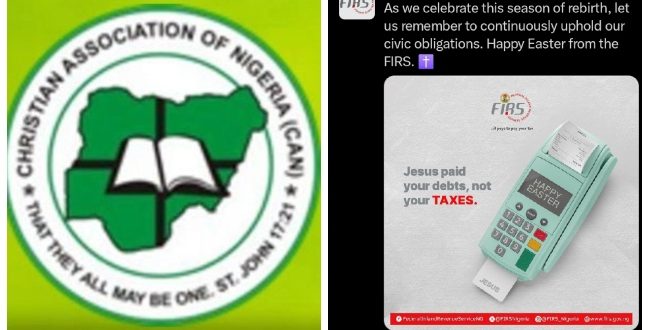
Angst, furore over FIRS Easter creative campaign
By Our Reporters: Phil Sholapo, Zion Rufus and Abimbola Mohammed
The creative campaign launched by the Federal Inland Revenue Service (FIRS) during the recently held Easter celebrations ostensibly to felicitate with Christian community in Nigeria has resulted in unprecedented anger and furore amongst teeming members of the Christian community.
Specifically, the campaign with headline Theme: “Jesus paid your debts, not your taxes posted on its X (formerly Twitter) have been hugely criticised as “provocative, egregious and in bad taste”.
Taking the lead in public umbrage and attack on FIRS for this creative effort, the Christian Association of Nigeria (CAN) said it deemed the easter message of the government agency offensive and provocative, demanding that FIRS should tender an unreserved apology to its members and Christians all over the world.
The FIRS in an X (formerly Twitter) post #FIRS Nigeria, had shared a picture of a point of sale machine with the caption, “Jesus Paid Your debts, not your taxes”. The post has since being eliciting responses from the Nigerian creative community and the general public who have condemned the post.
Although the post has been taken down, CAN’s National Director of National Issues and Social Welfare, Abimbola Ayuba, in a statement had called on President Bola Tinubu, the Minister of Finance, Wale Edun, and the Department of State Services to take cognisance of the incident and guide the FIRS in adhering to only messages that promote unity and peace.
The statement read in part, “In the light of recent events, we call upon the management of the FIRS to retract the message and offer a public apology for the distress caused.
“We also urge the President of the Federal Republic of Nigeria, Senator Bola Ahmed Tinubu, Minister of Finance, Wale Edun, and the Department of State Services to take cognisance of this incident and to guide the FIRS in adhering to communication strategies that promote respect, unity, and cohesion.
“As a nation that prides itself on religious harmony and peaceful coexistence, we are deeply concerned by the recurrence of provocative messages around religious holidays.
This year, a public institution, which should be the bastion of exemplary conduct, has been implicated in disseminating content that is widely regarded as offensive and derogatory to the Christian faith.
“The Easter period, a time of solemn reflection and sacred observance for Christians, should not be juxtaposed with civic obligations in a manner that trivialises or mocks core religious beliefs. Religious convictions are at the heart of our identity and deserve the utmost respect.
“The analogy drawn by the FIRS between the pivotal Christian doctrine of redemption, and the civic duty of tax payment has been received with distress and indignation by the Christian community”
Members of the Nigerian creative community have equally expressed divergent views on the creative campaign. In an exclusive interview with MARKETING EDGE, some have argued that the message, while factual, was poorly executed and failed to acknowledge the significance of Jesus’ sacrifice. Others believe that mentioning iconic religious figures in advertising headlines is taboo and should be avoided altogether.
The ad’s attempt to link the concept of tax payment with the Easter narrative was criticized for its potential to offend.
In his own consideration Mr. Israel Obatunde, CEO of IDEAS ORIGIN, stressed the significance of crafting messages that honor sensitivities and beliefs. Arguing against using religious figures in advertising headlines, Israel advocated for a more respectful approach.
“I believe a good message could still be passed without mentioning ‘Jesus’, let alone quantifying what He paid for or did not,” the IOM CEO stated.
Obinna Inogbo, Principal PR Executive at Worktainment Limited, found the ad non-offensive. Appreciating its creativity and underlying message about personal responsibility, Inogbo said, ” And it’s the truth he paid our debts but he didn’t pay our taxes. This means that paying debt doesn’t mean you won’t pay anything in life, it just means we are given greater grace upon ourselves to make mistakes. It doesn’t mean that life is free so I don’t find it offensive.”
Other industry experts have equally also weighed in on the conversation.
Omnicom Media Group’s Group Executive Director for West & Central Africa, Mr. Adeyinka Adebayo remarked that while the message was factual, its delivery undermined the significance of Jesus’ sacrifice.
He told MARKETING EDGE, “For me, I think this is a right message expressed the wrong way. It’s a factual statement but the way it is stated tends to undermine or limit the important sacrifice of Jesus Christ, and that’s most unacceptable. Imagine stating it thus: Jesus has paid your debts, be responsible enough to pay your Taxes.’ I don’t think anyone would have frowned at this. Truth is what you say is not as important as how you say it, and how you say it might not even be as important as when it is said. It is important to be conscious of WHAT to say, HOW to say it and WHEN it is to be said.”
Mr. Bolaji Alausa, Creative Director at Noah’s Ark, acknowledged the ad’s premise but cautioned against its potentially divisive nature, suggesting alternative approaches for a more inclusive tone.
“As a creative piece of work, the ad is fine. It’s premised on two existing truths: Jesus died for our sins, citizens must pay their taxes. The problem it might have is tagging the issue of tax avoidance with an Easter message. A Christian can argue that FIRS is saying that the whole faith does not pay their taxes, because they believe all debt has been
‘paid’. When you also consider Nigeria’s unique landscape and how sensitive we are with religious matters, more caution should have been used. A few things could have softened the edge. Jesus paid OUR debts, instead of YOUR,” Alausa said.
“Would’ve been more inclusive and less us against them. Or a funnier tone: Jesus paid our debts, but we’ll have to sort our taxes ourselves. Personally I don’t mind edgy ads, they engender conversation, and that’s why we’re here. But we must always consider all angles when dealing with religion and politics in Nigeria,” the Creative Director added.
Highlighting the broader meaning of Christ’s sacrifice, CEO of Digisplash, Damola Richard Salvador, interpreted the message through biblical context.
He stated, “So if you say he paid your debts, not your health, come do health care, It’s wrong, He paid for it all. Nothing missing including death. But I also get what they mean saying he paid your debts not your taxes. Maybe they mean he paid his debts.
Think the person that came up with it doesn’t really understand the Word. A better way would have been. He paid all debts including his taxes”. Then a sub copy: Pay your taxes.”
However, renowned Creative Adman Dennis Onifade criticized FIRS for its insensitivity, suggesting a less confrontational approach that respects the sanctity of religious festivals.
“What the FIRS should have done to avoid the needless controversy is to just feature the POS imagery of a spiritual transaction and on-screen HAPPY EASTER message without the provocative headline. A goodwill message should be goodwill, not insulting or conveying ill will. Granted, an organization may leverage its goodwill message to subtly advertise its services, but not by insulting the intelligence of the target audience.”
“In the case of FIRS, its tagline “It pays to pay your tax” is sufficient as a subtle reminder to people to pay taxes. If there must be a headline at all, it could be something like “As you celebrate Easter, count your blessings and pay your dues thereafter.” This would be less abrasive than “Jesus paid your debts, not your taxes.” By the way, as FIRS must be aware that Nigeria is a multi-cultural, multi-religious country, do they plan to also do a goodwill message during a Muslim festival like Eid el Fitr, telling Nigerian Muslims indirectly to also pay their taxes? Or how do they intend to balance the communication paradigm they have set that would not make it appear or sound as if only Christians need to be reminded to pay tax or only Christians are potential tax defaulters?”
While some defended the ad as a creative expression, others pointed out that it could have been more inclusive and considerate of religious sensitivities. Other experts’ suggestions for improvement include reframing the message to be less divisive and avoiding unnecessary provocations.




Comment
No comments found.